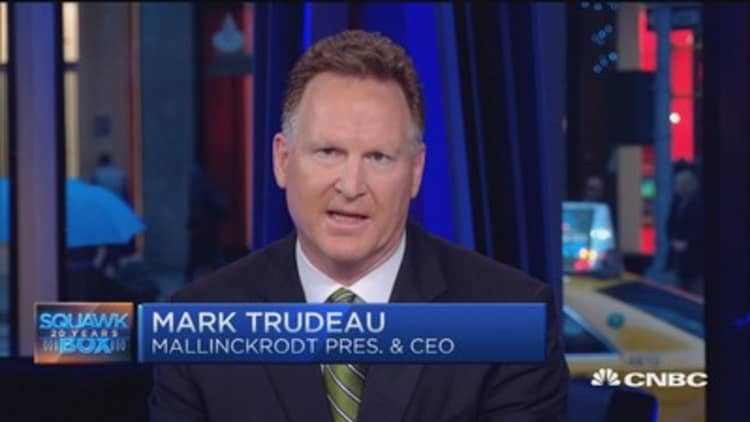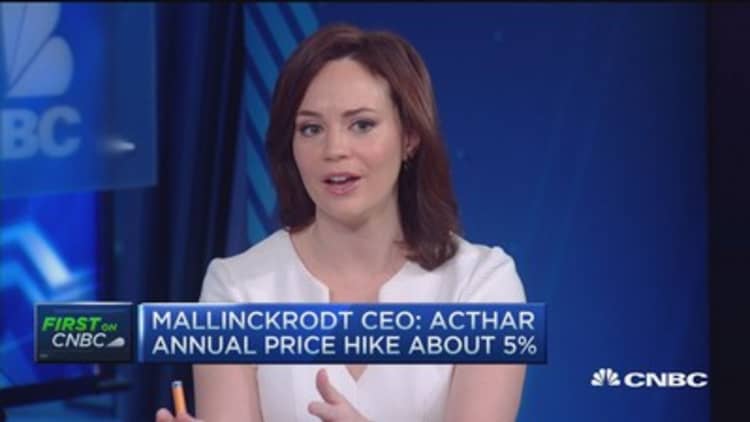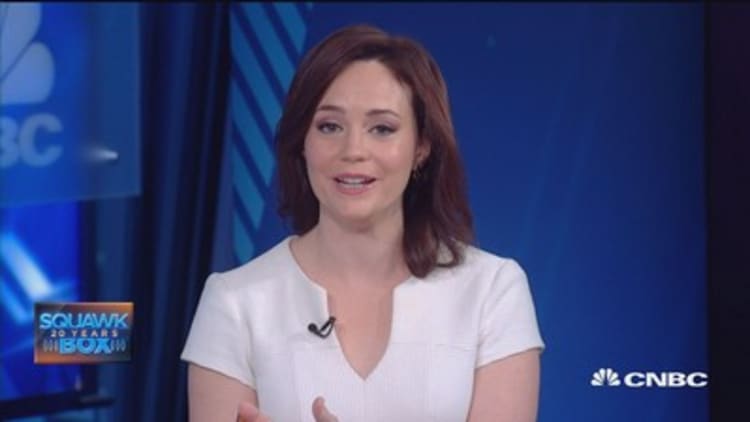


Mallinckrodt CEO Mark Trudeau on Tuesday rejected short seller Citron Research's contention that it would face challenges being reimbursed for a high-priced specialty drug.
Shares of Mallinckrodt PLC fell as much as 25 percent and trading was halted multiple times due to volatility after Citron Research tweeted the company had more downside than Valeant Pharmaceuticals at these levels.
Mallinckrodt's shares dropped 17 percent on Monday in the regular trading session, to close at $58.01. The stock was down about 1.7 percent in premarket trading Tuesday.
In an email to CNBC, Citron's Andrew Left said: "The market has been so focused on Valeant that they forgot about other platform companies who are levered and face the same headwinds in reimbursement. We already see these challenges at Mallinckrodt and while Valeant has been taking all the heat, the business model of Mallinckrodt is just as, if not more, in danger of unraveling."
On Tuesday, Trudeau told CNBC's "Squawk Box" the company's model is both "unique" and "classical."
He said it is unique in that Mallinckrodt focuses on areas of "high-end medical need," typically acquiring products and then investing in them to produce clinical data and data that help determine the value of one therapy over another, a discipline known as pharmacoeconomics.
The model is classical in terms of the way Mallinckrodt promotes and develops its drugs because it reinvests in its business to create long-term, sustainable value, he added.
Mallinckrodt shares have been sliding since late October, when Citron Research published the now infamous "Valeant: Could this be the Pharmaceutical Enron?" report.
The report caused Valeant shares, a favorite of hedge fund managers like Bill Ackman, to lose half of their value through this week and thrust the controversial founder of Citron into the spotlight.
Skeptics have focused on Mallinckrodt's acquisition of Questcor in August 2014, which makes H.P. Acthar Gel, a drug whose pricing was raised from $40 to more than $28,000 a vial over a decade, according to The New York Times.
Trudeau said the original price hike occurred eight years ago before Mallinckrodt owned the drug, and cost increases have averaged 5 percent annually since then. He said Mallinckrodt's profit margins for Acthar had not increased since it bought the drug because the company continually invests in research to expand its use.
The drug was originally used exclusively to treat infantile spasms that block neurological development, but research has since broadened its use to 19 different diseases.
Still, Morgan Stanley said last month that Mallinckrodt had a "high" risk of having its pricing practices scrutinized, a scenario that could negatively impact the shares, according to the firm. Valeant was also on Morgan Stanley's list.
Trudeau noted that Acthar is used in patients with limited options and said the cost of alternatives are dramatically higher at the point of treatment at which the drug is typically prescribed.
"What we do find is that as we have gone in and spoken to payers about how to best position Acthar for the appropriate patient types, we're getting very good traction and good dialogue with those payers," he said.
There was no indication from Citron's Left as to when he would publish the report.
Mallinckrodt reports its fourth-quarter results on Nov. 23, and it is slated to give an investor briefing on Dec. 7.
CORRECTION: This story has been updated to reflect that shares of Mallinckrodt closed at $58.01 on Monday.




